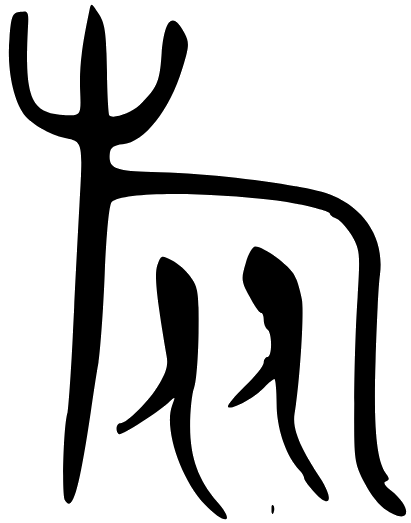Following your flag
The name of Hexagram 56 is lu 旅, Travelling. The Chinese character (which also means a division of troops) originally shows people around the flag, and was normally written simply with two people under the flag, almost as if sheltering under a roof:
An ancient Chinese settlement would be built around its banner, which was planted to mark the centre. In Hexagram 56, your flag is on the move – and so too is your centre.
Two things follow from this:
- you are not at home (so act accordingly!), and
- you are carrying your centre, your identity and purpose, with you.
The meaning of not being at home comes into sharper focus when you consider that the complementary hexagram – the one made by changing every line of 56 – is 60, Measuring.
Measuring means building shared standards by mutual agreement, like creating a shared language. Travelling is like being in a foreign country: you’re not a native speaker, nor are you going to persuade the locals to speak your language; you’d better have a good translation app, and watch carefully to see how the locals behave, and ensure you don’t break written or unwritten laws.
The Oracle says,
‘Travelling, creating small success.
Travelling, constancy brings good fortune.’
Here are those two aspects: you can create small success, participate in your environment in a small way, but obviously should not expect to create great change. And constancy – steadily following your own flag on your own journey – brings good fortune.
The story of King Hai
It seems the authors of the Yi had a specific traveller in mind for this hexagram. Hai was the king of a nomadic people who led his flocks to pasture in the state of Yi. (This is the same word ‘Yi’ as in ‘Yijing’: Hai actually travelled to a place called Change.)
At first all went well: he was well-received by the king and his people. But he had an affair with the queen, who became pregnant; he was killed, and the King of Yi appropriated his flocks.
56 line 6 says,
‘The bird burns its nest.
Travelling people first laugh, afterwards cry out and weep.
Lose cattle in Yi.
Pitfall.’
That seems a pretty clear story of Hai, who had awakened the queen’s desire with a ‘dance with shield and plumes’.
The whole story…?
Stephen Field takes this further, and reads the whole story in the lines: Hai is the traveller courting disaster in line 1, and then…
‘Traveller comes to a resting place,
Cherishes his own,
Gains a young helper.
Constancy.’
At first, he settles successfully in Yi.
‘Traveller burns down his resting place
Loses his young helper.
Constancy: danger.’
Then his own risk-taking runs him into danger.
‘Traveller in a place to stay,
Gains property and an axe.
My heart is not glad.’
This would be about Hai’s brother Heng, who conspired in Hai’s death and was banished from Yi, but later returned and was again accepted by the king. (The ancient diviner, says Field, is the one saddened by this immoral behaviour.)
‘Shooting a pheasant,
Gets it with one arrow.
So in the end, praise and a mandate.’
The one shooting the pheasant is Hai’s son Jia Wei, who conquered Yi and reclaimed the flocks.
And then the recap of Hai’s fate:
‘The bird burns its nest.
Travelling people first laugh, afterwards cry out and weep.
Lose cattle in Yi.
Pitfall.’
Whether or not you’re convinced by this mapping of the whole story onto the lines, it’s definitely helpful to remember the cautionary tale of King Hai when you’re the one Travelling. He danced his own people’s dance; perhaps he even followed his own people’s marriage customs. He cheerfully ignored the customs of the place he was visiting, and so he came to a sticky end. When in Rome…
Wu’s mirror
Travelling’s paired hexagram – the one that’s actually the same six lines, inverted – is 55, Abundance. That centres on the story of King Wu at the garrison city of Feng: how he had to assume the kingship, read the signs, gather his allies, curtail his mourning and lead his armies out to overthrow the Shang.
Travelling, with its portrait of the isolated (and feckless) Hai – a Shang ancestor – is a hall-of-mirrors reflection of kingship. The ruler is alone in someone else’s country, needing to observe someone else’s rules, and ultimately doomed when he doesn’t. Everything centres on Wu: all decisions, all responsibilities, all resources, all allies. Hai is very much alone; even his own brother proves unreliable.
‘Abundance has many causes; few connections for the Traveller.’
Yet Hai as well as Wu carries the weight of being the ruler, and Travelling also has themes of responsibility and decisiveness. After all, Hai is responsible for his people’s cattle – their livelihood. The traveller walks under his own flag: he’s taking his own centre with him, into a place where no-one else will recognise it. This brings its own kind of pressure.
The two hexagrams, Abundance and Travelling, share the same nuclear hexagram: 28, Great Exceeding. Its image of the roofbeam buckling under excess weight is echoed in the burned shelter and nest of 56.3.6.
When you cast hexagram 56, you might well be coming from 55’s moment of decision. The change between these hexagrams can be deeply disquieting: Abundance, Feng, was hectic and demanding, but it was your domain, and everything there supported your authority. Then you march out…
‘Exhausting greatness naturally means letting your dwelling place go, and so Travelling follows.’
…leaving your citadel and your ‘greatness’ behind, and can end up feeling quite isolated and exposed. I’ve seen this refer to the experience of an author once his book is published – his private discoveries, nurtured at home with such care, now travelling alone through the foreign territory of everyone else’s theories and conversations.











